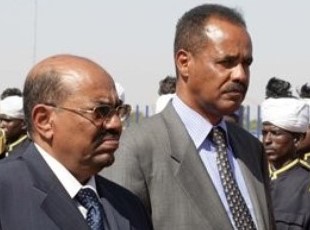
The feud between Eritrea and Sudan has been attributed to many causes and none–by those who maintain that there is no feud. Some have claimed that it is due to Eritrea’s decision to align its foreign policy closer with Egypt even as the latter’s relationship with Sudan was deteriorating. Others have claimed that Sudan’s decision to deploy more troops to the Eritrean border had only to do with its decision to enforce an agreement with Europe on controlling human trafficking. We have received information that the real reason had to do with Sudan uncovering credible information that Eritrean President Isaias Afwerki was conspiring to have Sudan’s President Omar Albashir deposed from power.
This may explain why the Government of Sudan has been giving contradictory information on the reason for deploying its troops to their common border.
Here’s what we know:
In early December, President Omar Albashir dispatched General Bakri Hassan Saleh, Sudan’s First Vice President and Prime Minister, to Eritrea. His trip was to relay one message: that President Omar Albashir hoped to visit Eritrea as soon as Sudan’s Independence Day celebrations (January 1) were over. After the usual courtesies, President Isaias Afwerki relayed his message: that he supports the assessment of United Arab Emirates and the US, i.e., that the problem with Sudan is not with the ruling party, National Congress Party (NCP), or its Islamist ideology but the person of Omar Albashir and, consequently, he (and UAE) would be very supportive of a Sudanese government presided over by General Bakri Hassan Saleh.
When he returned to Sudan, General Bakri Hassen Saleh delivered the statement he heard from President Isaias Afwerki, word for word, to the Sudanese President. Then, in a special session of NCP, he repeated it to all the delegates.
The Sudan-Eritrea border remains closed. Sudanese authorities have arrested many activists of the People’s Front for Democracy & Justice (PFDJ), Eritrea’s ruling party. The contraband business, which was crucial for hard-currency-starved Eritrea, has been brought to a halt, bringing shortage of all imports to Eritrea.
Eritrea already has strained relationships with Djibouti over a border dispute and Ethiopia over another unresolved border dispute. Now, with the Sudanese border closed, it will have to be even more dependent on UAE and Saudi Arabia who need its port city of Asab for their bombing raids of Yemen, another neighbor with whom Eritrea had a “border war.”